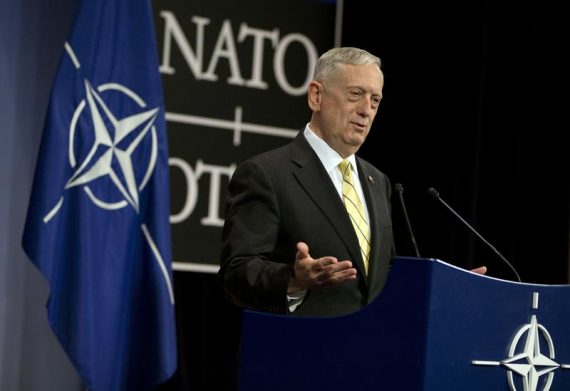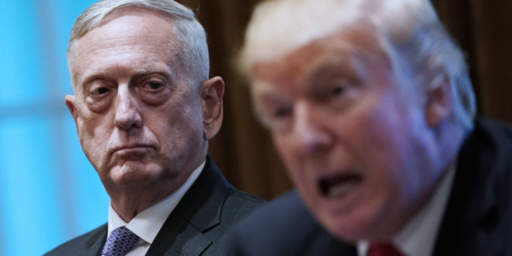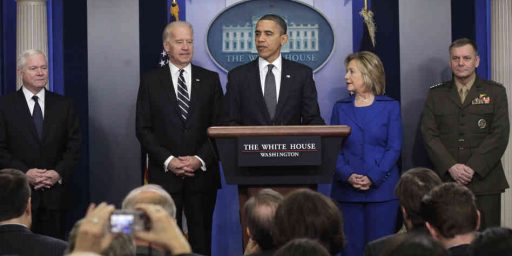Mattis Right on NATO
My latest is out at RealClearDefense.
A piece I wrote two weeks ago for another publication appeared at RealClearDefense this morning: ”Mattis Is Mostly Right on NATO.”
The lede:
In his first speech to NATO defense ministers as the U.S. Secretary of Defense, Jim Mattis suggested that, if Allies do not start contributing more by the end of the year, the United States might “moderate its commitment.” While the timing is less than ideal, given growing concerns about the Trump administration posture towards Russia, this message is a long time coming.
The caveats:
I share the concerns of my fellow Atlanticists that the Trump administration risks overplaying its hand. The desired end state must be to bolster NATO by turning more members into security contributors, not fracture it.
The Article 5 commitment at the heart of NATO that an armed attack against any member “shall be considered an attack against them all” must remain sacrosanct. And, it is worth reminding ourselves, the only time it has been carried out was when the other Allies came to American aid in the wake of the 9/11 attacks. Still, that guarantee is much more valuable when backed by 28 countries pulling their weight rather than a handful.
As Gates noted in that famous speech six years ago, “true friends occasionally must speak bluntly with one another for the sake of those greater interests and values that bind us together.” Bluntness must not, however, give way to bluster. Which is certainly a danger with this new administration, headed by a novice president prone to early-morning Twitter fights with those who annoy him.
As Careleton political scientist Steve Saideman, co-author of NATO in Afghanistan, notes, spending as a percentage of GDP is not the only measure of contribution to NATO. Despite its woeful economic contribution, his own adopted country of Canada lost 158 dead supporting the American-led war in Afghanistan, which was more than any NATO member other than the US or the UK. And, on a per capita basis, tiny Denmark and Estonia lost more than any other ally.
Additionally, as Jim Townsend, who served eight years as Deputy Assistant Secretary of Defense for Europe and NATO under President Obama (and a one-time Atlantic Council colleague), rightly points out, the flexibility and logistical capabilities provided by European basing rights is a tremendous contribution to not only the Alliance but also American power projection.
Additionally, decades of working together have brought enormous advantages in command and control and interoperability that must not be lost.
Mattis’ opening gambit struck the right tone, simultaneously reassuring Allies of American commitment to NATO while declaring that patience for free-riding has reached its end. Still, the political and fiscal realities in most NATO capitols are such that expecting a radical policy shift in a mere ten months is unrealistic. Julianne Smith, who had a major hand in writing Gates’ 2011 speech as Principal Director for European and NATO Policy, suggests 2020 as a more realistic deadline. That strikes me as more tenable.
Regardless, decades of begging the Allies to pick up a greater share of their own defense have simply not worked. It is well past time for a new approach.
In between is a discussion of the long history–including speeches by President Obama and two of his Secretaries of Defense–of US kvetching about Allies not pulling their weight.






I agree with you on the merits, but timing is everything. With Trump, his staff, and other Republicans seemingly in the Russian’s pockets, this new found insistence on contributions is going to be interpreted differently than if Hillary Clinton or Jeb Bush was making it. If nothing else, it’s going to be very difficult for our allies to ask for tax increases from their own people to pay for this.
Mattis is not capable of reassuring anyone of anything. No one is ever going to believe the man-baby’s cabinet secretaries – not when a 3 AM tweet can reverse the US position, not when the Russian-Republican issue is still out there ticking like a time bomb. The US has zero credibility at this point.
I’m in London doing World Book Day, had dinner last night with publishing people, who tell me their Eastern European partners expect war with Russia and expect to be abandoned by the US. Of course those are just book people, not defense people, but I suspect they’re right as to the sense of the common folk in the east.
Mattis’ reassurance goes only as far as a hope that he can be the adult stopping Trump from starting a nuclear war. Hoping for anything more from General Mattis is pointless. A fish rots from the head, and no matter how patriotic, dedicated and professional the fins and tail may be, this fish’s head is sprouting maggots.
@MarkedMan: Yes, caveated the timing in the intro. There really wasn’t much choice on that, though: Mattis was there for a ministerial ahead of the Munich Security Conference. And Trump’s previous comments were the elephant in the room.
@michael reynolds: Pretty much my entire national security network is highly concerned about all of this. The administration is way, way behind on staffing—with indicators that they may never staff up in some agencies—and seems to have no coherent decisionmaking process. This was a same-day reaction to the remarks, which were coming under what I believed to be unjustified fire from the Atlanticist community.
Fake news? Or evidence that Trump, Bannon et. al. are seriously unhinged?
@michael reynolds:
You could have stopped right there; that sums it up perfectly.
The only thing I’d add is that no one believes even Trump himself, because he’s just as likely to reverse his own position with a 3 AM tweet as he is his secretaries. Trump’s only belief, his only principle, his only ideology, is that whatever is convenient for him at the moment is the only thing that matters.
@James Joyner: I’m ignorant on this: what is “the Atlanticist community”? And – how is pronounced? Soft ‘c’?
Respectfully, there seems to me that there is a yuuuuge difference between advocating for a stronger NATO Alliance in which every participant gives full measure and the present Administration’s questioning of the Alliance’s over-all usefulness in a period in which terrorism is the primary threat. What we have been hearing from Pres Trump about the EU and NATO is predicated on their ‘America First’ platform. I have personally not seen a damn thing that makes me think they respect our allies.
I would agree with Michael R’s friends. If I were a native of the Baltic or Balkan states I’d expect to find myself in a Russian satellite-state within the next four years either by subversion or invasion. The chance that a Trump administration would defend me would seem very very remote.
Open Question: How many days, weeks, months, years is Mattis going to be willing/able to go around the world putting out the fires that the Tweetster-in-Chief lights? Should we be starting a blog betting pool?
NATO(And North Korea and Japan) allows the United States to block ALL warm-waters seaports in Russia if they wanted to do so. Russia could be a large Paraguay if Washington wanted to do so.
NATO bases in Italy gives large advantage against from the air, and bases in Germany, and NATO bases in the Baltic States, Germany and Poland gives large advantage in land.
You can question whether having such large military advantage over Russia is wise(Russia is historically a country that want to play in larger military leagues that it’s economy entitles them to do), but that’s a large strategic advantage. That’s more than simply defending Europe.
I hope that no one will take me as a defender of the puerile self-aggrandizement and volatility that characterize our President, but I have long had questions about NATO. I think that military pacts should have expiration dates. A new administration should undertake a serious review of America’s security needs. NATO triumphed over the USSR, but does it have a role in today’s world? Sure, it can bottle up Russia, but where would Europe get its natural gas? Personally, I believe that diverting military funding to development of non-petroleum based energy sources will do more to rid us of the need to get involved in the wars of all against all that define Syria, Yemen, and the rest of that world. I am sure that duty in Brussells is delightful for our generals; you can get the really good poutaine there, but maybe it’s time to move on.
Didn’t Trump recently say that the NATO nations increasing contributions would be used to offset his (Trump’s) requested increase in the US military budget?
Can anyone tell me how that would work?
For example if Canada doubles it’s defense spending (bringing it up to the NATO guidelines, of approx 36 billion), does that mean that the US can reduce it’s defense budget by 18 billion?
I didn’t think it worked that way.